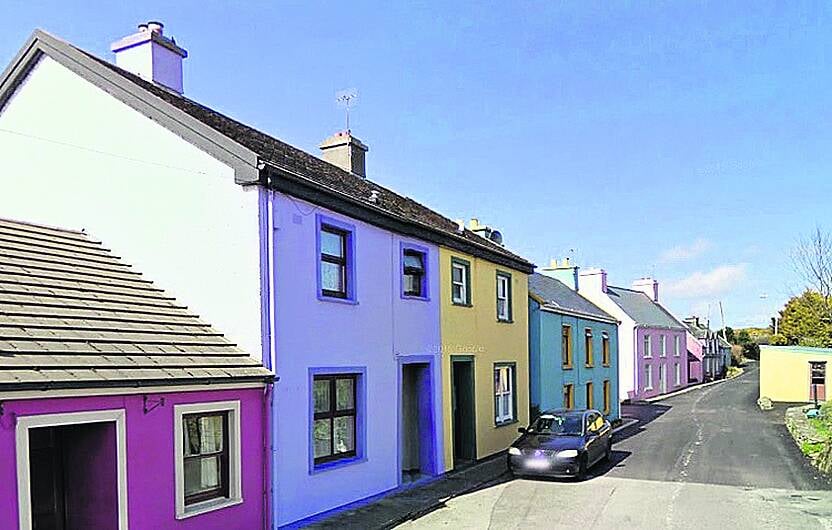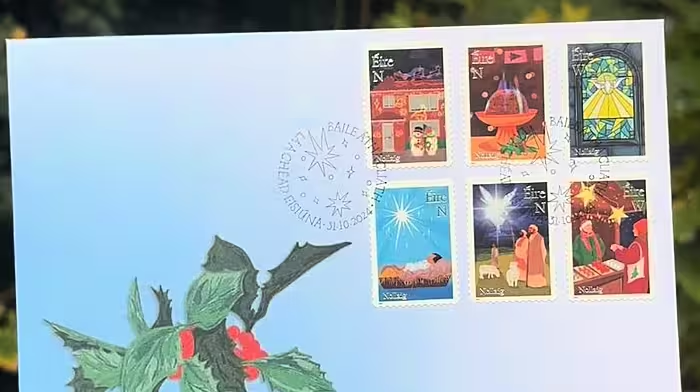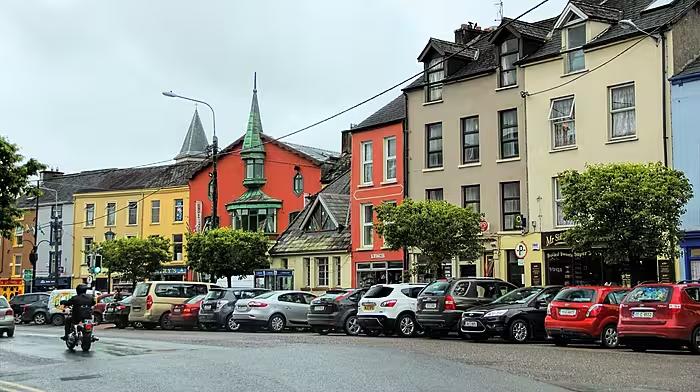The first successful raid on an RIC barracks for weapons after the Rising took place in Eyeries on St Patrick's Day, 1918. West Cork journalist Marc O'Sullivan Vallig recalls the role his grandfather Chris O'Connell played
ON St Patrick’s Day in 1918 the Volunteers in Beara paraded in Castletownbere. It was ostensibly a show of strength, with companies from Eyeries, Urhan, Inches and Ballycrovane participating, as well as those from Castletownbere, Bere Island and Adrigole. To minimise the risk of arrest, the men carried ash plants, pick handles or hurleys in place of weapons, but in truth they had few weapons anyway.
That was why, five miles away in Eyeries, a small party of Volunteers planned to raid the RIC barracks for arms. My grandfather Chris O’Connell was one of that party, along with Seán O’Driscoll – who led the operation – Joe Foley, Con O’Dwyer and Peter O’Neill. Two others – Chris’s younger brother David and James McCarthy – were posted as look-outs.
As dusk settled, the raiders disguised themselves and crept around the back of the village, gathering at the east gable of the barracks. Two of the RIC men stationed there, Sergeant Nugent and Constable Quinlan, were known to have gone into town to observe the parade, but two others – Constables Cahill and Dalton – were believed to be on duty.
Chris, armed with a .32 calibre revolver, went on around the front alone, intending to bang on the front door and imitate Sergeant Nugent while demanding that the constables open up. As it happened, Cahill had slipped out to the pub, and Dalton, fearful that he might not return before the sergeant, opened the door just as Chris was approaching it. What happened next must have taken mere seconds: Chris whipped out his revolver, pointed it at Dalton and ordered, “Hands up!”
Dalton responded by pointing his finger, hoping Chris would mistake it for a weapon in the dark, and Chris reacted by pulling the trigger on his pistol twice in quick succession. There were two dull clicks; the only rounds of ammunition in the chambers were both duds.
Dalton went to shut the door, but Chris knocked him down and overpowered him in the hallway. Again, Chris ordered the constable to raise his hands, and this time, Dalton obeyed. The other Volunteers soon came spilling in the door. They tied Dalton up and searched the premises for weapons, seizing four Lee Enfield Carbine rifles and a quantity of ammunition from a strongroom upstairs before making good their escape.
This was the first successful raid on an RIC barracks for weapons after the Rising of 1916, and naturally it caused the police force considerable embarrassment.
After an inquiry, Cahill was sacked. So, too, was Dalton, whose version of events the authorities chose not to accept, preferring to believe he, too, had been absent from the barracks, when in fact he had done his best to defend it. Dalton, to his eternal credit, never identified his assailants, though he must surely have recognised at least some of them, given that all five were near neighbours.
Over the next three years, my grandfather participated in attacks on the RIC barracks in Allihies and the coastguard station in Ballycrovane. He fought in many other engagements around West Cork with Tom Barry’s flying column, leading one of the sections at the Crossbarry ambush in March 1921, and helping carry the mine that blew open the front door of the RIC barracks in Rosscarbery when the IRA laid siege to it weeks later.
Chris’s brothers and sisters were also active in the struggle. His older brother Ned was a blacksmith who forged Croppy pikes for the nascent Volunteers, while David participated in several local engagements, and their sisters Bella and Louise were prominent in Cumann na mBan.
The family had two houses side by side on the hill in Eyeries. The lower house was a pub, the upper one a private residence. This upper house was soon commandeered by the RIC, and later by the British Army. The O’Connell sisters charmed their sentries, trading sods of turf or cups of tea for as many as 20 rounds of ammunition, which they duly passed on to the Volunteers.
In the early stages of the War of Independence, the RIC were left to bear the brunt of the Volunteers’ aggression. This was a deliberate policy of the British authorities’, who worried that sending in the army would be to acknowledge how great a threat the Volunteers had come to represent. Most RIC men were Irish, and many were sympathetic to the Republican cause, but they bore the King’s arms, which made them legitimate targets in the eyes of the Volunteers. The British did them no favours, either, when they eventually mobilised the Black and Tans and the Auxiliaries, often stationing them in RIC barracks so the different forces were barely distinguishable.
The RIC had also the great misfortune to be at the landlords’ beck and call. When they wanted tenants evicted, they called on the RIC to accompany their agents to the cottages, sometimes battering down doors, knocking walls or caving in roofs, and as often as not seizing the tenants’ possessions and dumping them outside.
In May 1907, my grandfather Chris, then aged 10, witnessed the notorious events in Kilmacowen and Gowlane, a few miles from Eyeries, when 300 RIC men accompanied the agents of the Leahy Estate to evict a number of hapless tenants and their families. I believe this incident above any other is what motivated him to help found the Volunteers in Eyeries.
It is easy to abhor violence in peacetime. One hundred years on, I am grateful indeed that the rounds of ammunition in my grandfather’s pistol were duds, and that Constable Dalton survived the raid on the RIC barracks in Eyeries. But it seems unlikely that Ireland would ever have achieved any meaningful degree of independence from Britain had it not been for the guerrilla war conducted by the IRA, in West Cork and elsewhere. The revolution was an idea whose time had come.
There are always those who will denounce the Volunteers as anti-English or anti-Irish Protestant. Those I knew were neither. Most were practising Catholics, certainly, but they had scant regard for the clergy, and their quarrel was not with the ordinary people of Britain, nor with the Protestant faith, but with the landlord class and the agents of Empire. Given the hardships and horrors the people of Britain endured in the course of the Great War, the only wonder is that they did not rise up against their masters, too.
In 2016, the nation commemorated the Easter Rising in a mature and dignified fashion. The next four years will see a wave of significant War of Independence anniversaries throughout West Cork – I hope we can mark them as admirably.







